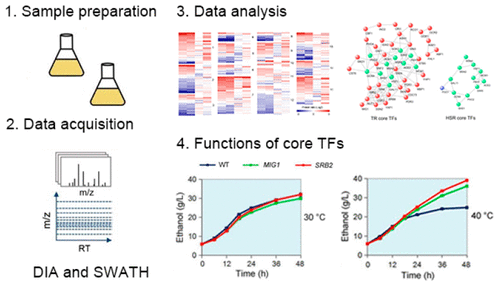当前位置:
X-MOL 学术
›
J. Proteome Res.
›
论文详情
Our official English website, www.x-mol.net, welcomes your feedback! (Note: you will need to create a separate account there.)
Distinct Proteome Remodeling of Industrial Saccharomyces cerevisiae in Response to Prolonged Thermal Stress or Transient Heat Shock
Journal of Proteome Research ( IF 4.4 ) Pub Date : 2018-04-09 , DOI: 10.1021/acs.jproteome.7b00842 Weidi Xiao 1 , Xiaoxiao Duan 1, 2 , Yuping Lin 2 , Qichen Cao 2 , Shanshan Li , Yufeng Guo 2 , Yuman Gan 2 , Xianni Qi 2 , Yue Zhou 3 , Lihai Guo 4 , Peibin Qin 4 , Qinhong Wang 2 , Wenqing Shui
Journal of Proteome Research ( IF 4.4 ) Pub Date : 2018-04-09 , DOI: 10.1021/acs.jproteome.7b00842 Weidi Xiao 1 , Xiaoxiao Duan 1, 2 , Yuping Lin 2 , Qichen Cao 2 , Shanshan Li , Yufeng Guo 2 , Yuman Gan 2 , Xianni Qi 2 , Yue Zhou 3 , Lihai Guo 4 , Peibin Qin 4 , Qinhong Wang 2 , Wenqing Shui
Affiliation

|
To gain a deep understanding of yeast-cell response to heat stress, multiple laboratory strains have been intensively studied via genome-wide expression analysis for the mechanistic dissection of classical heat-shock response (HSR). However, robust industrial strains of Saccharomyces cerevisiae have hardly been explored in global analysis for elucidation of the mechanism of thermotolerant response (TR) during fermentation. Herein, we employed data-independent acquisition and sequential window acquisition of all theoretical mass spectra based proteomic workflows to characterize proteome remodeling of an industrial strain, ScY01, responding to prolonged thermal stress or transient heat shock. By comparing the proteomic signatures of ScY01 in TR versus HSR as well as the HSR of the industrial strain versus a laboratory strain, our study revealed disparate response mechanisms of ScY01 during thermotolerant growth or under heat shock. In addition, through proteomics data-mining for decoding transcription factor interaction networks followed by validation experiments, we uncovered the functions of two novel transcription factors, Mig1 and Srb2, in enhancing the thermotolerance of the industrial strain. This study has demonstrated that accurate and high-throughput quantitative proteomics not only provides new insights into the molecular basis for complex microbial phenotypes but also pinpoints upstream regulators that can be targeted for improving the desired traits of industrial microorganisms.
中文翻译:

工业酿酒酵母响应长时间的热应力或瞬态热冲击的不同蛋白质组重塑
为了深入了解酵母细胞对热应激的反应,已通过全基因组表达分析对经典热激反应(HSR)的机理进行了深入研究,对多种实验室菌株进行了深入研究。然而,酿酒酵母的强大工业菌株在全球分析中,几乎没有人探讨过发酵过程中耐热反应(TR)的机理。在本文中,我们对所有基于理论质谱的蛋白质组学工作流程进行了独立于数据的采集和顺序窗口采集,以表征工业菌株ScY01的蛋白质组重塑,以响应长时间的热应力或瞬态热冲击。通过比较TR和HSR中ScY01的蛋白质组学特征以及工业菌株和实验室菌株的HSR的蛋白质组学特征,我们的研究揭示了在耐热性生长或热休克期间ScY01的不同反应机制。此外,通过蛋白质组学数据挖掘对转录因子相互作用网络进行解码,然后进行验证实验,我们发现了两种新型转录因子的功能,Mig1和Srb2,在增强工业菌株的耐热性方面。这项研究表明,准确,高通量的定量蛋白质组学不仅为复杂微生物表型的分子基础提供了新见解,而且还指出了可用于改善工业微生物所需性状的上游调节剂。
更新日期:2018-04-10
中文翻译:

工业酿酒酵母响应长时间的热应力或瞬态热冲击的不同蛋白质组重塑
为了深入了解酵母细胞对热应激的反应,已通过全基因组表达分析对经典热激反应(HSR)的机理进行了深入研究,对多种实验室菌株进行了深入研究。然而,酿酒酵母的强大工业菌株在全球分析中,几乎没有人探讨过发酵过程中耐热反应(TR)的机理。在本文中,我们对所有基于理论质谱的蛋白质组学工作流程进行了独立于数据的采集和顺序窗口采集,以表征工业菌株ScY01的蛋白质组重塑,以响应长时间的热应力或瞬态热冲击。通过比较TR和HSR中ScY01的蛋白质组学特征以及工业菌株和实验室菌株的HSR的蛋白质组学特征,我们的研究揭示了在耐热性生长或热休克期间ScY01的不同反应机制。此外,通过蛋白质组学数据挖掘对转录因子相互作用网络进行解码,然后进行验证实验,我们发现了两种新型转录因子的功能,Mig1和Srb2,在增强工业菌株的耐热性方面。这项研究表明,准确,高通量的定量蛋白质组学不仅为复杂微生物表型的分子基础提供了新见解,而且还指出了可用于改善工业微生物所需性状的上游调节剂。



























 京公网安备 11010802027423号
京公网安备 11010802027423号